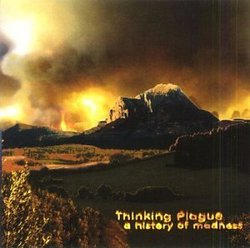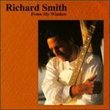| All Artists: Thinking Plague Title: History of Madness Members Wishing: 0 Total Copies: 0 Label: Cuneiform Original Release Date: 1/1/2003 Re-Release Date: 9/16/2003 Genres: Alternative Rock, Pop, Rock Styles: Progressive, Progressive Rock Number of Discs: 1 SwapaCD Credits: 1 UPC: 045775018027 |
Search - Thinking Plague :: History of Madness
 | Thinking Plague History of Madness Genres: Alternative Rock, Pop, Rock
|
Larger Image |
CD DetailsSimilar CDs
|
CD ReviewsTrue 21st century avant-rock. Lord Chimp | Monkey World | 12/05/2003 (5 out of 5 stars) "From the beginning, Thinking Plague has been a band of original, fun, and challenging music -- a real "complete package." Their songs were always complex and often atonal, noisy, and scary, yet it always had a real visceral "rock" and fiery inspiration that made it very fun to listen to.Things are different thing time around. The lineup is pretty much the same as before: twelve-tone based vocals, guitar, bass, drums, clarinet, saxophone, piano, and synths. Looks like a fleshed-out rock band at first glance, but the overall sound is pretty different. _A History of Madness_ is very chamber-y sounding, with the rock element assimilated into a collective with refined poise. This is not so much a "fun" album. On the whole this more Henry Cow - _Western Culture_-ish than previous Thinking Plague albums. The drums and bass are not given the punch of their last album, _In Extremis_, -- the overall mix has the instruments in a balanced, egalitarian way into a big tapestry of polymetrical atonal frenzy. Basically it sounds like all the elements, individually, stand out less than before and the total composite intricacy and dynamic relationships are emphasized in a great fashion. The result is a dense, dissonant, and elaborate stuff that can completely arrest your attention. And it does require a lot of attention: in order to really appreciate it, one must listen very carefully and deconstruct the individual elements, understand their purpose, and rebuild to view the whole picture. The acuity in some of the sonic architecture here is superlative. I should also say that David Shamrock plays some of the weirdest rock drumming I've ever heard.The album also uses quite a bit of minimalism to build-up for the thorny atonal eruptions the band undergoes, a powerful example being the middle of first song. Some songs drift into hazy soundscapes, eerie ambience in the way only Thinking Plague can do it. (Consider some of the more soundscapey parts of _In Extremis_ -- these ones are better realized and more musically accomplished.) "Least Aether For Saxophone & Le Gouffre" is two main parts, first a tonally wrenching piece for solo horn and the second a haunting soundscape of menace, darkness, and tension. There are also the four "Marching As To War" pieces. I'm not really sure what they are, just strange, short (all of them are around a minute in length) pieces for piano ensemble, rather playful in a deranged way. "Gúdamy le Máyagot (An Phocainn Theard Deig)" is like a forgotten secret from a hidden sphere of Eastern European folk music, a dark, demented gypsy jam.I think my only beef with the album is "Rapture of the Deep", which is an uncanny, beautiful song but it just SCREAMS for vocals from Susanne Lewis (TP's former vocalist). But that's really more of a personal wish than a detriment to the CD. Deborah Perry's precise vocal virtuosity is stunning in any case. None of the songs are as long as previous TP epics, but they are still greatly epic, due to the gravity of their themes and the dark, dramatic, powerful flow (songs like "Blown Apart" and "Lux Lucet"). Apparently this is also a concept album but I have no clue what it's about.I found it addicting from the get-go and it continues to mesmerize me with each listen. Truly progressive, avant-rock at its finest. I'd say if you're new to the band, _In This Life_ is the best starting point -- it remains their most definitive work (in my opinion) and is one of the best albums I have ever heard. As I said, this is the least "fun" Thinking Plague album and it can be difficult to listen to. Nonetheless, this is probably the most complex 'modernist' TP album and is worthy of your attention. I go to sleep to it often (a compliment!). The next album can't come soon enough." Ingenious blend of styles. Eric Schneider | Tucson, AZ USA | 11/17/2003 (5 out of 5 stars) "Thinking Plague uses very contemporary avant-garde techniques to create some of the most provocative "progressive rock" music to date. In my opinion, even calling this music "progressive rock" is a bit demeaning. People who want to hear more Rush or Dream Theater should look elsewhere, but those who want to hear 'progressive' music in the strict sense of the term have come to the right place.Take a lot of Stravinsky, a little Bartok, a ton of Messiaen, a tad of early King Crimson, and a hell of a lot of stuff that you've never heard in your life, and you've got what appears to be the best ensemble going into the 21st century: Thinking Plague.A word of warning about History of Madness: The layers upon layers of dissonant vocal overdubs might scare off a first-time listener of the band. It's really quite brilliant the way it's done, but it's extremely unusual - keep an open mind.My vote for album of the year (if that means anything)." Intelligent, heartfelt and playful Nefertiti Kestenbaum | Fremont, CA | 10/08/2003 (5 out of 5 stars) "Thinking Plague's intelligent and deeply felt compositions stimulate both the mind and the soul. Dense, layered, tuneful, and rhythmically exuberant, these pieces offer the listener hidden treasures that grow the more one hears it. Highly recommended."
|

 Track Listings (12) - Disc #1
Track Listings (12) - Disc #1
